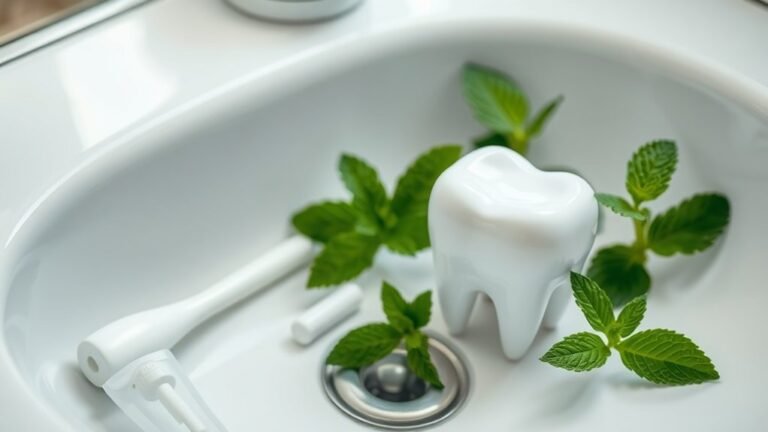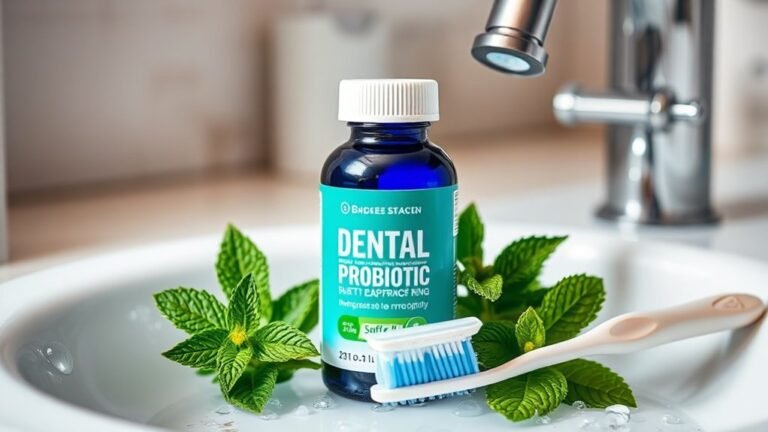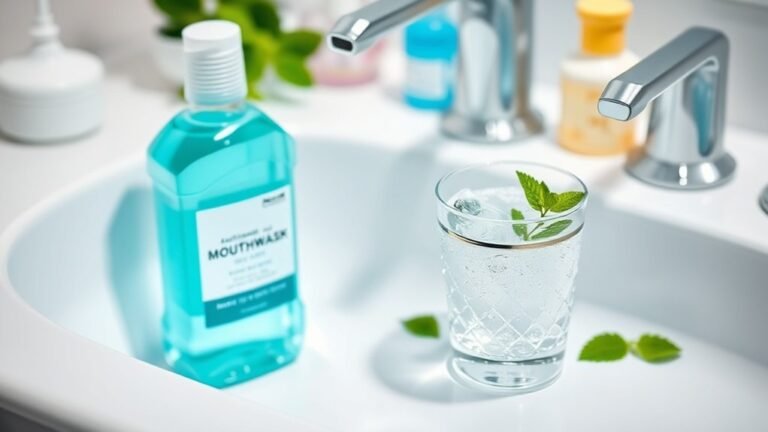What Are the Best Dental Hygiene Habits to Prevent Periodontal Disease
To prevent periodontal disease, maintain ideal dental hygiene by brushing twice daily for two minutes with a soft-bristled toothbrush and fluoride toothpaste. Don’t forget to floss daily to remove plaque from hard-to-reach areas. Schedule regular dental check-ups every six months for professional cleanings that eliminate tartar and monitor gum health. Additionally, eat a balanced diet rich in vitamins and minerals, avoid tobacco products, and stay hydrated to support your oral health. Learn more about essential practices for healthy gums.
Key Takeaways
- Brush teeth at least twice a day for two minutes using a soft-bristled toothbrush at a 45-degree angle to the gum line.
- Floss daily to remove plaque and food particles between teeth that brushing cannot reach, promoting healthier gums.
- Use fluoride toothpaste to strengthen enamel and consider toothpaste formulated for gum health to prevent periodontal issues.
- Schedule regular dental check-ups and professional cleanings every six months to monitor gum health and remove tartar buildup.
- Maintain a balanced diet rich in vitamins and minerals while avoiding excessive sugar and processed foods to support gum health.
Understanding Periodontal Disease
Periodontal disease, often unnoticed in its early stages, is a serious gum infection that can damage the soft tissue and destroy the bone supporting your teeth. It typically starts with gingivitis, characterized by inflammation and bleeding of the gums. If you ignore these early signs, the condition can progress to more severe forms of periodontal disease, leading to tooth loss and other health complications. Symptoms may include persistent bad breath, swollen gums, and loose teeth. Understanding the difference between gingivitis and periodontal disease is essential for early intervention. Regular dental check-ups and maintaining good oral hygiene can help you catch these issues before they escalate. Taking action now can protect your dental health for years to come.
The Importance of Daily Brushing
Brushing your teeth daily is essential for maintaining good oral health and preventing periodontal disease. It’s not just about how often you brush, but also the technique you use and the type of toothbrush you choose. Understanding these factors can greatly enhance your dental hygiene routine.
Brushing Technique Matters
Effective daily brushing is vital for maintaining ideal oral health and preventing periodontal disease. Your brushing technique plays a significant role in effectively removing plaque and food particles from your teeth and gums. To guarantee you’re brushing correctly, consider these key points:
- Use a soft-bristled toothbrush at a 45-degree angle to your gums.
- Move the brush in gentle, circular motions to reach all surfaces of your teeth.
- Don’t forget to brush your tongue to eliminate bacteria and freshen your breath.
Frequency and Duration
Daily brushing is essential for ideal oral health, and it’s recommended to brush at least twice a day for two minutes each session. This routine plays a vital role in maintaining your dental care and preventing periodontal disease. Effective brushing removes plaque buildup that can lead to gingival bleeding and inflammation if left untreated. By committing to this frequency and duration, you greatly reduce your risk of gum disease. Remember, consistency is key; brushing in the morning and before bed helps keep your gums healthy and your teeth clean. Additionally, a thorough brushing routine not only protects against gingivitis but also promotes overall oral hygiene. Don’t underestimate the power of daily brushing—it’s your first line of defense against dental issues.
Choosing the Right Brush
Selecting the right toothbrush is essential for maintaining ideal oral health and preventing periodontal disease. A good toothbrush can effectively remove plaque and bacteria, reducing the risk of tooth decay and gum inflammation. Here are some key factors to evaluate when choosing your toothbrush:
- Bristle type: Opt for soft bristles to avoid damaging your gums.
- Head size: Choose a size that comfortably fits your mouth for easy access to all areas.
- Manual vs. electric: Both can be effective, but electric brushes may provide a more thorough clean.
Choosing the Right Toothbrush and Toothpaste
Choosing the right toothbrush and toothpaste plays an essential role in maintaining your oral health and preventing periodontal disease. For effective plaque control, opt for a soft-bristled toothbrush that can gently clean your teeth without damaging your gums. Look for a toothbrush that fits comfortably in your hand and allows you to reach all areas of your mouth easily.
When it comes to toothpaste, choose one that contains fluoride, as it helps strengthen enamel and fight cavities. Additionally, consider toothpaste formulated for gum health, which can further assist in preventing periodontal issues. Regularly replacing your toothbrush every three to four months guarantees peak performance, promoting better plaque control and overall dental hygiene.
Mastering Effective Brushing Techniques
To maintain ideal oral health, mastering effective brushing techniques is essential. You’ll want to focus on the proper brush angle, adhere to the two-minute brushing rule, and choose soft bristles for gentle yet effective cleaning. By implementing these practices, you can greatly reduce your risk of periodontal disease.
Proper Brush Angle
Mastering the proper brush angle is essential for effective dental hygiene and preventing periodontal disease. Position your toothbrush at a 45-degree angle to your gum line. This technique helps remove plaque effectively, reducing the risk of gum disease and bleeding gums.
Here are some tips to enhance your brushing technique:
- Use gentle, circular motions to avoid damaging your gums.
- Focus on the gum line, where plaque accumulates most, to prevent inflammation.
- Don’t forget to brush the inner surfaces of your teeth for a thorough clean.
Two-Minute Brushing Rule
The two-minute brushing rule is a straightforward yet essential guideline for maintaining ideal oral hygiene and preventing periodontal disease. Spending at least two minutes brushing your teeth guarantees you thoroughly clean all surfaces, promoting effective dental hygiene. Divide your mouth into quadrants and dedicate 30 seconds to each section, focusing on both teeth and gum tissue. Use gentle, circular motions to remove plaque and food particles without damaging your gums. Regular adherence to this rule helps disrupt the buildup of harmful bacteria that can lead to gum inflammation and periodontal issues. Remember, brushing too quickly can leave areas uncleaned, increasing your risk of dental problems. So, set a timer and commit to those full two minutes for healthier gums and teeth.
Soft Bristle Benefits
Choosing the right toothbrush can greatly impact your oral health, and soft bristles are often the best option for effective brushing. They offer several benefits, especially for those with gum sensitivity or prone to gum irritation. Using a soft-bristled toothbrush helps you maintain a gentle touch while still effectively removing plaque.
- Reduces the risk of damaging your gums
- Minimizes discomfort during brushing
- Enhances plaque removal without causing irritation
The Role of Flossing in Gum Health
While brushing your teeth is essential for overall oral hygiene, flossing plays an important role in maintaining gum health. It removes plaque and food particles from areas that your toothbrush can’t reach, helping to prevent gum disease. Regular flossing reduces inflammation and promotes healthier gums, ultimately lowering your risk of periodontal disease.
Here’s a quick reference table illustrating the benefits of flossing:
| Benefit | Description | Frequency |
|---|---|---|
| Plaque Removal | Eliminates plaque between teeth | Daily |
| Gum Health | Reduces inflammation and disease risk | At least once a day |
| Fresh Breath | Removes food particles | Daily |
| Overall Health | Links oral health to systemic health | Daily |
Incorporating Mouthwash Into Your Routine
Flossing is an essential step in your oral hygiene routine, but incorporating mouthwash can further enhance your efforts to prevent periodontal disease. By using mouthwash, you can reach areas of your mouth that brushing and flossing might miss. Look for mouthwashes that contain antibacterial properties to fight plaque and gingivitis. You might also consider options with oral probiotics, which help maintain a healthy balance of bacteria in your mouth.
- Choose an alcohol-free mouthwash to avoid dryness.
- Use mouthwash after brushing and flossing for maximum effectiveness.
- Consider mouthwashes with added fluoride for extra cavity protection.
Regular Dental Check-ups and Cleanings
Regular dental check-ups and cleanings are essential for maintaining ideal oral health. These visits not only provide professional cleaning to remove plaque and tartar but also allow for early detection of potential issues before they develop into more serious problems. By prioritizing routine visits, you can greatly reduce your risk of periodontal disease and guarantee your smile stays healthy.
Importance of Routine Visits
Routine visits to your dentist are crucial in maintaining ideal oral health and preventing periodontal disease. Regular dental checkups allow your dentist to monitor your gum health and catch any signs of gum infection early. These visits offer essential benefits that contribute to your overall well-being:
- Early detection of potential issues that could lead to periodontal disease.
- Professional guidance on effective home care practices to enhance your routine.
- Personalized treatment plans tailored to your specific dental needs.
Professional Cleaning Benefits
While regular visits to the dentist are important for monitoring gum health, professional cleanings provide an added layer of protection against periodontal disease. These cleanings focus on tartar removal, which daily brushing and flossing can’t fully achieve. Tartar buildup can lead to gum inflammation, increasing the risk of periodontal issues.
Here’s a quick overview of professional cleaning benefits:
| Benefit | Description | Frequency |
|---|---|---|
| Tartar Removal | Eliminates hardened plaque | Every 6 months |
| Inflammation Control | Reduces gum inflammation and improves overall health | As needed, based on condition |
| Education | Provides personalized dental care tips | During each visit |
| Early Intervention | Addresses potential issues before they worsen | Ongoing |
Regular cleanings not only maintain your smile but also safeguard your long-term dental health.
Early Detection of Issues
Maintaining your dental health hinges on consistent check-ups and cleanings, as these appointments play a crucial role in the early detection of potential issues. Regular visits allow your dentist to monitor your oral microbiome and identify signs of periodontal disease before they escalate.
- Early identification of gum inflammation or recession
- Assessment of plaque buildup and its impact on your oral microbiome
- Personalized advice on improving your dental hygiene routine
A Balanced Diet for Healthy Gums
A balanced diet plays an essential role in supporting healthy gums, as the nutrients you consume directly influence your oral health. By incorporating a variety of fruits, vegetables, whole grains, and lean proteins, you provide your body with the vitamins and minerals necessary for gum healing and overall wellness. Vitamin C, for instance, is crucial for collagen production, which keeps your gums strong and resilient. Additionally, calcium and vitamin D work together to maintain bone health, supporting the structures that hold your teeth in place. Avoid excessive sugar and processed foods, as they can lead to gum inflammation and disease. Prioritizing a balanced diet not only enhances your gum health but also contributes to a healthier, brighter smile.
Avoiding Tobacco Products
Avoiding tobacco products is essential for preserving your gum health and preventing periodontal disease. Tobacco use compromises your immune system, making it harder for your body to fight off infections, including those caused by harmful bacteria in your mouth. This can lead to increased plaque buildup, gum inflammation, and ultimately periodontal disease.
To effectively protect your gums, consider the following:
- Quit smoking or using smokeless tobacco to improve your overall oral health.
- Seek support from professionals or support groups to help you stay tobacco-free.
- Practice good oral hygiene to enhance bacteria control and strengthen your immune system.
Staying Hydrated for Oral Health
Hydration plays a significant role in supporting oral health and preventing periodontal disease. When you stay hydrated, you help maintain the moisture balance in your mouth, which is crucial for keeping the gingiva healthy. Sufficient saliva production not only washes away food particles but also neutralizes acids produced by bacteria, reducing the risk of gum pain and infection. Dehydration can lead to dry mouth, increasing plaque buildup and the potential for periodontal issues. Aim to drink plenty of water throughout the day to support saliva flow and promote overall oral health. Additionally, incorporating water-rich foods can further enhance your hydration efforts, ensuring your gingiva remains resilient against disease. Remember, a well-hydrated mouth is essential for preventing gum-related problems.
Frequently Asked Questions
How Often Should I Replace My Toothbrush?
You should replace your toothbrush every three to four months or sooner if the bristles are frayed. Regular replacements guarantee effective cleaning and help maintain your overall dental health, reducing the risk of infection.
Can Stress Affect My Gum Health?
Yes, stress can negatively impact your gum health. While you’re busy managing life’s pressures, your body may respond with inflammation, increasing the risk of gum disease. Prioritize stress management for better oral health.
What Are the Signs of Early Periodontal Disease?
You’ll notice signs of early periodontal disease, like swollen or bleeding gums, persistent bad breath, gum recession, and increased tooth sensitivity. Detecting these symptoms early can help you manage and prevent further complications effectively.
Is Mouthwash Necessary for Oral Hygiene?
Mouthwash isn’t strictly necessary for oral hygiene, but studies show it can reduce plaque by 26%. Using it alongside brushing and flossing enhances your routine, freshens breath, and helps reach areas your brush might miss.
Can Diet Alone Prevent Periodontal Disease?
Diet alone can’t prevent periodontal disease. While a balanced diet supports overall oral health, combining it with proper dental hygiene practices like brushing, flossing, and regular dental check-ups is essential for effective prevention.
Conclusion
In your quest for healthy gums, remember that consistency is key. Just as a gardener tends to their plants, nurturing your oral hygiene habits will keep periodontal disease at bay. By brushing, flossing, and visiting your dentist regularly, you cultivate a vibrant smile. A balanced diet and hydration further nourish your gums, while steering clear of tobacco acts as a protective shield. Embrace these habits, and your efforts will bloom into lasting oral health for years to come.






